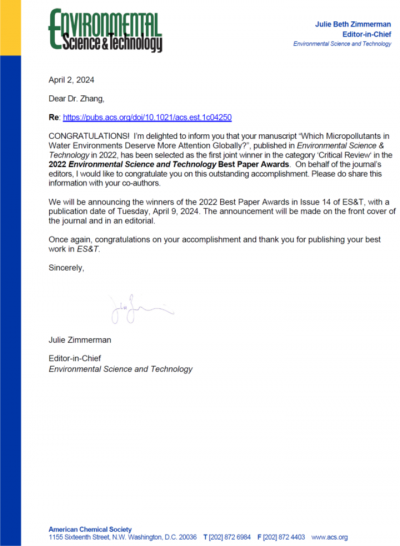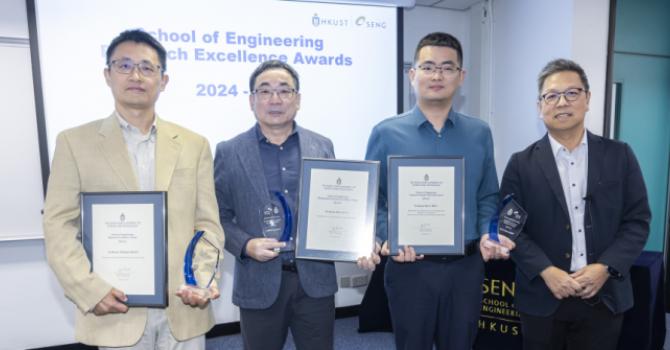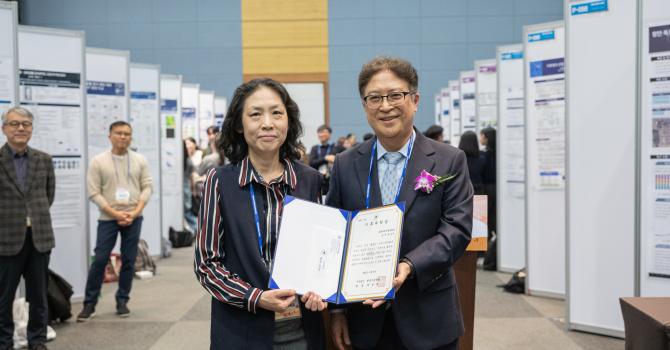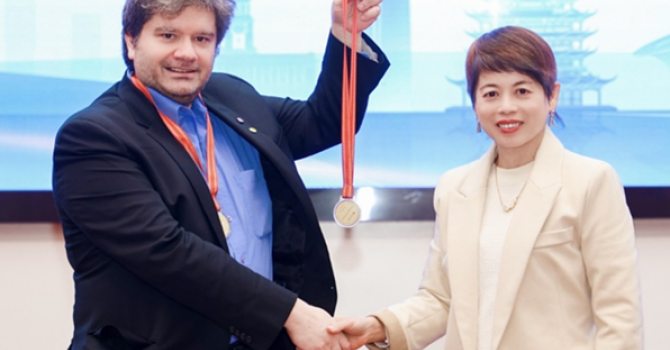Prof. Xiangru Zhang and Students/Colleagues Receive the 2022 Environmental Science and Technology Best Paper Award
Congratulations to Prof. Xiangru Zhang of the Department of Civil and Environmental Engineering for receiving the 2022 Environmental Science and Technology Best Paper Award. Congratulations also go to his coauthors, including Prof. Zhang’s former PhD students Yun Yang (now Postdoc at Beijing Normal University), Jiarui Han (now Research Assistant Professor at HKUST), Wanxin Li (now Assistant Professor at Xi'an Jiaotong-Liverpool University), and Jingyi Jiang (now Assistant Professor at Changsha University of Science & Technology), as well as his colleagues Xiaoyan Li (University of Hong Kong), Kenneth Leung (City University of Hong Kong), Shane Snyder (Nanyang Technological University) and Pedro Alvarez (Rice University).
This highly prestigious award recognizes the high importance and impact of their paper “Which Micropollutants in Water Environments Deserve More Attention Globally?” (https://pubs.acs.org/doi/10.1021/acs.est.1c04250), which not only provides a comprehensive review of the ever-increasing chemical pollution in water environments, but also answers an important lingering question — which micropollutants or class of micropollutants deserve more attention globally and should be given higher priority for removal? This paper is selected because it represents “the most vital and influential work in the field. This selection process is based on several criteria, including the quality and novelty of the work as well as the impact that the work has had on advancing environmental sciences and engineering.” This paper serves as an important resource for researchers and for regulatory decisions — its impact is evidenced by the fact that it has already amassed over 200 citations on google scholar since its publication about a year ago.
More than 219,000,000 chemicals have been compiled in the Chemical Abstracts Service Registration, and this number is still increasing by about 15,000 every day. Over 350,000 chemicals and chemical mixtures are registered for production and use, resulting in their release into wastewater, surface water, groundwater, and marine water. The typical concentrations of these pollutants in water bodies are in the range of nanograms to micrograms per liter, and thus they are also referred to as micropollutants. Lifelong and even multigenerational exposures to micropollutants are of concern to aquatic organisms and human health. A prerequisite for better control of chemical pollution is the prioritization of micropollutants in global water environments. In this paper, Prof. Zhang and his coauthors first compile a total of 83 prioritization case studies using the risk quotient method and select 473 compounds (out of 3466) with risk quotients greater than 0.01. To determine the micropollutants of global concern, they propose a “weighted average risk quotient”, which integrates both risk intensity and frequency of micropollutants in global water environments to achieve a more comprehensive priority determination. Through metadata analysis, they recommend a ranked list of 53 micropollutants for risk management and remediation.
One of Prof. Zhang’s research interests is the detection, identification, control and toxicity evaluation of new disinfection byproducts and micropollutants in waters. He has generated 100 journal papers, 59 of which are published in Nature Water, Nature Communications, Science Bulletin, Environmental Science & Technology and Water Research. His 12 papers have been ranked as “ESI top 1% highly cited papers” by Web of Science. His 12 PhD graduates and 6 MSc EVEM graduates work as professors at universities. In recognition of his achievements in the field of disinfection byproducts, he was invited to give plenary presentations at the “Gordon Research Conference on Drinking Water Disinfection Byproducts” four consecutive times in 2012, 2015, 2017 and 2019.
Prof. Zhang along with his coauthors would like to thank the ES&T editors and the American Chemical Society (ACS) for selecting and bestowing upon their article the “Best Paper” title. With over 140 years of championing the advancement and implementation of chemistry and its practitioners, the ACS is one of the world’s largest scientific organizations that continue to play a vital role in promoting scientific research and education. In particular, ACS Publications is committed to publishing high-quality, high-impact papers from top authors across the world. The ACS ES&T Best Paper Award is therefore especially prestigious.
Congratulations to Prof. Zhang and his students and colleagues.





